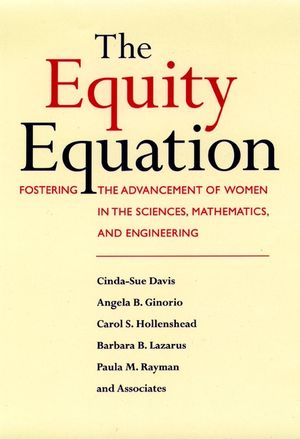The Equity Equation: Fostering the Advancement of Women in the Sciences, Mathematics, and EngineeringISBN: 978-0-7879-0213-1
Hardcover
384 pages
April 1996, Jossey-Bass
 This is a Print-on-Demand title. It will be printed specifically to fill your order. Please allow an additional 10-15 days delivery time. The book is not returnable.
|
||||||
"The Equity Equation is indeed a 'sourcebook for change' as the
authors describe it. the book is chock full of essential data and
clear thinking about pervasive, complex biases that continue to
stymie women's and girl's opportunities in science, math, and
engineering--in school, on the job. What does an economic future
for this country look like with less than half of its scientific
innovators? Read this book if you're a researcher, educator, policy
maker, or anyone else concerned about equity and a viable future
for science and technology in the next century." --Mary Ellem
Capek, executive director, National Council for Research on
Women
"A comprehensive and thorough review of the studies on women in the sciences, mathematics, and engineering of the past couple of decades. From grade school to the corporate world, from socioeconomic status to sexual orientation, what has been studied is here. The thoughtful analysis which concludes the book will be the guide to studies and actions for the next decade. It is a must read for anyone in this field." --Laurel L. Wilkening, chancellor, University of California, Irvine
"The Equity Equation deals candidly, thoroughly, and objectively with issues for women in science, engineering, and mathematics-- issues about which I became increasingly concerned during my tenure on the National Science Board. This much-needed study not only investigates the institutional causes of gAnder inequity, but lays out the research, policy, and programs needed to change the status quo." --James Duderstadt, president, University of Michigan and former member, National Science Board
"A comprehensive and thorough review of the studies on women in the sciences, mathematics, and engineering of the past couple of decades. From grade school to the corporate world, from socioeconomic status to sexual orientation, what has been studied is here. The thoughtful analysis which concludes the book will be the guide to studies and actions for the next decade. It is a must read for anyone in this field." --Laurel L. Wilkening, chancellor, University of California, Irvine
"The Equity Equation deals candidly, thoroughly, and objectively with issues for women in science, engineering, and mathematics-- issues about which I became increasingly concerned during my tenure on the National Science Board. This much-needed study not only investigates the institutional causes of gAnder inequity, but lays out the research, policy, and programs needed to change the status quo." --James Duderstadt, president, University of Michigan and former member, National Science Board



